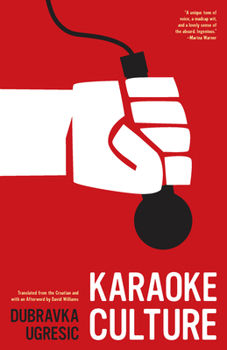Karaoke Culture
Select Format
Select Condition 
Book Overview
Finalist for the NBCC award for Criticism. "Ugresic is sharp, funny and unafraid. . . . Orwell would approve."--Times Literary Supplement Over the past three decades, Dubravka Ugresic has established herself as one of Europe"s greatest--and most entertaining--thinkers and creators, and it's in her essays that Ugresic is at her sharpest. With laser focus, she pierces our pop culture, dissecting the absurdity of daily life...
Format:Paperback
Language:English
ISBN:1934824577
ISBN13:9781934824573
Release Date:October 2011
Publisher:Open Letter
Length:324 Pages
Weight:1.00 lbs.
Dimensions:1.0" x 5.5" x 8.4"
Customer Reviews
1 rating
KARAOKE CULTURE: The urgent philosophy of on pop culture
Published by Elis Like The Island , 2 years ago
After taking a few weeks to mull over Dubravka Ugresic’s Karaoke Culture, I took a rainy afternoon and watched a movie with Chinese food. The movie was High Fidelity and I’ve seen it many times, but never have I thought about the final lines so much before. With uncharacteristic selflessness, Rob Gordon explains how to make a good mix tape:
“The making of a great compilation tape, like breaking up, is hard to do and takes ages longer than it might seem. You gotta kick off with a killer, to grab attention. Then you got to take it up a notch, but you don’t wanna blow your wad, so then you got to cool it off a notch. There are a lot of rules.”
Pardon the vulgarity, but Mr. Gordon has a point: when making a compilation, you have to start hard and strong, go harder still, then back off for a while. He didn’t say this, but you also need to finish just as well as you started, if not better. If the same rules apply to collections of essays, Ugresic is a triumphant follower of the letter of the law. The opening essay introduces us to what a “karaoke culture” is—and it feels like seeing a liger. That is, it’s just familiar enough that you can follow along and understand, but it’s also got that touch of exotic mystery so everything seems new and intriguing. For example, everyone knows what karaoke is; but in Ugresic’s eyes, it becomes the symbol of our time. Bloggers are karaoke. Asian teenagers writing cell phone novels are karaoke. Men recreating the Hollywood sign in Serbia are karaoke. Minibars are karaoke. Victoria Beckham is karaoke. Even the Yugoslavian political struggles are karaoke. So what, then is karaoke?
Karaoke is the way communication technology has made it harder for us to communicate with each other. Karaoke is celebrating the amateur instead of the auteur. Karaoke is celebrating pop-culture idols and condemning “the classics.” Karaoke is the equality of everyone having a voice, and having everyone’s voice be equally loud. Karaoke is when Joshua Bell, a famous violinist, can make huge amounts of money at a concert in Boston, but isn’t even given the time of day performing solo in a subway station. Karaoke is complicated.
To be honest, I don’t completely understand it yet. To completely understand the concept, you’d have to sit with this collection of essays for some time, first contemplating each one individually and then try to assemble them all into a sort of argument or conclusion. I have been working at this for some weeks and have mostly marveled at the full array of delicious language and interesting assertions. Karaoke culture itself is still mysterious and alluring, and no definite conclusions have been formed; I’ll be pondering this text for some time. Fortunately, that is a pleasurable task.
According to Ugresic, karaoke culture is to be chronicled, celebrated and criticized—often all in the same breath. She writes in a way that meanders while somehow being simple and direct. At times, she comes straight out with her bits of philosophy, as when she asserts that “the absence of dialogue in contemporary films is stark proof of the humiliating absence of the need for dialogue,” because today’s women have nothing of value to say. Other times, Ugresic avoids such straightforward statements, preferring instead to tantalize the reader with beautiful language that is better to let stew in your brain. Sentences like, “Invisible files from my archive would fall on me leaves, and at times I thought I was going to faint, lose control, and be forever submerged beneath that lush and invisible pile” have haunted me for weeks. And in still other moments, the text is terribly funny, as when Ugresic recounts many tragic anecdotes about Croatians dying at sea, and then remarks that “upon hearing these brief statistics, a naïve reader might conclude that Croats in the late nineteenth and early twentieth century used the sea for nothing but drowning.” These essays touch on Tito, “fan ficcers,” literary festivals and her own e




